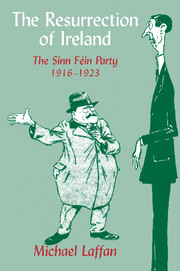Book contents
- Frontmatter
- Contents
- List of illustrations
- List of figures and tables
- Preface
- Note on the text
- List of abbreviations
- PROLOGUE: BEFORE THE EASTER RISING
- THE IRISH REVOLUTION, 1916–1923
- 2 Rebellion and hibernation, 1916
- 3 Organizers and converts, 1917
- 4 Reverses and victory, 1918
- 5 The party: structures and members
- 6 Policy: beliefs and attitudes
- 7 War and repression, 1919–1921
- 8 Ministers and bureaucrats, 1919–1921
- 9 The treaty and the split, 1921–1922
- 10 The Pact election and the Civil War, 1922–1923
- EPILOGUE: AFTER THE CIVIL WAR
- Select bibliography
- Index
6 - Policy: beliefs and attitudes
Published online by Cambridge University Press: 05 March 2012
- Frontmatter
- Contents
- List of illustrations
- List of figures and tables
- Preface
- Note on the text
- List of abbreviations
- PROLOGUE: BEFORE THE EASTER RISING
- THE IRISH REVOLUTION, 1916–1923
- 2 Rebellion and hibernation, 1916
- 3 Organizers and converts, 1917
- 4 Reverses and victory, 1918
- 5 The party: structures and members
- 6 Policy: beliefs and attitudes
- 7 War and repression, 1919–1921
- 8 Ministers and bureaucrats, 1919–1921
- 9 The treaty and the split, 1921–1922
- 10 The Pact election and the Civil War, 1922–1923
- EPILOGUE: AFTER THE CIVIL WAR
- Select bibliography
- Index
Summary
After the 1918 general election Fr O'Flanagan is said to have remarked that ‘the people have voted Sinn Féin. What we have to do now is to explain to them what Sinn Féin is.’ Long before the party's triumph one of its main tasks was to enlighten or inform the electorate, and it had a substantial body of beliefs or attitudes which could be fed into its propaganda machine.
Many of these were unimpressive. Griffith and other, lesser writers were publicists rather than intellectuals, and they said little that was new. With the exception of Connolly, who applied Marxist ideas to Irish conditions, they did not engage in the sort of intellectual debates which preoccupied many of their counterparts in other countries. They preached the merits of a republic but did not discuss such ‘republican’ concepts as the rights and duties of the citizen. Their arguments simply justified the struggle against Britain, and they tended to reinforce or rationalize the assumption that an elect few had a right or a duty to dominate the masses; the Irish nation was not the Irish people, but rather those members of Sinn Féin who had the self-confidence (or arrogance) to speak on its behalf. This elitism can be discerned in most aspects of the party's policy.
People joined Sinn Féin in their tens of thousands because they were attracted by its image, not because they believed in its ideology.
- Type
- Chapter
- Information
- The Resurrection of IrelandThe Sinn Féin Party, 1916–1923, pp. 214 - 265Publisher: Cambridge University PressPrint publication year: 1999



